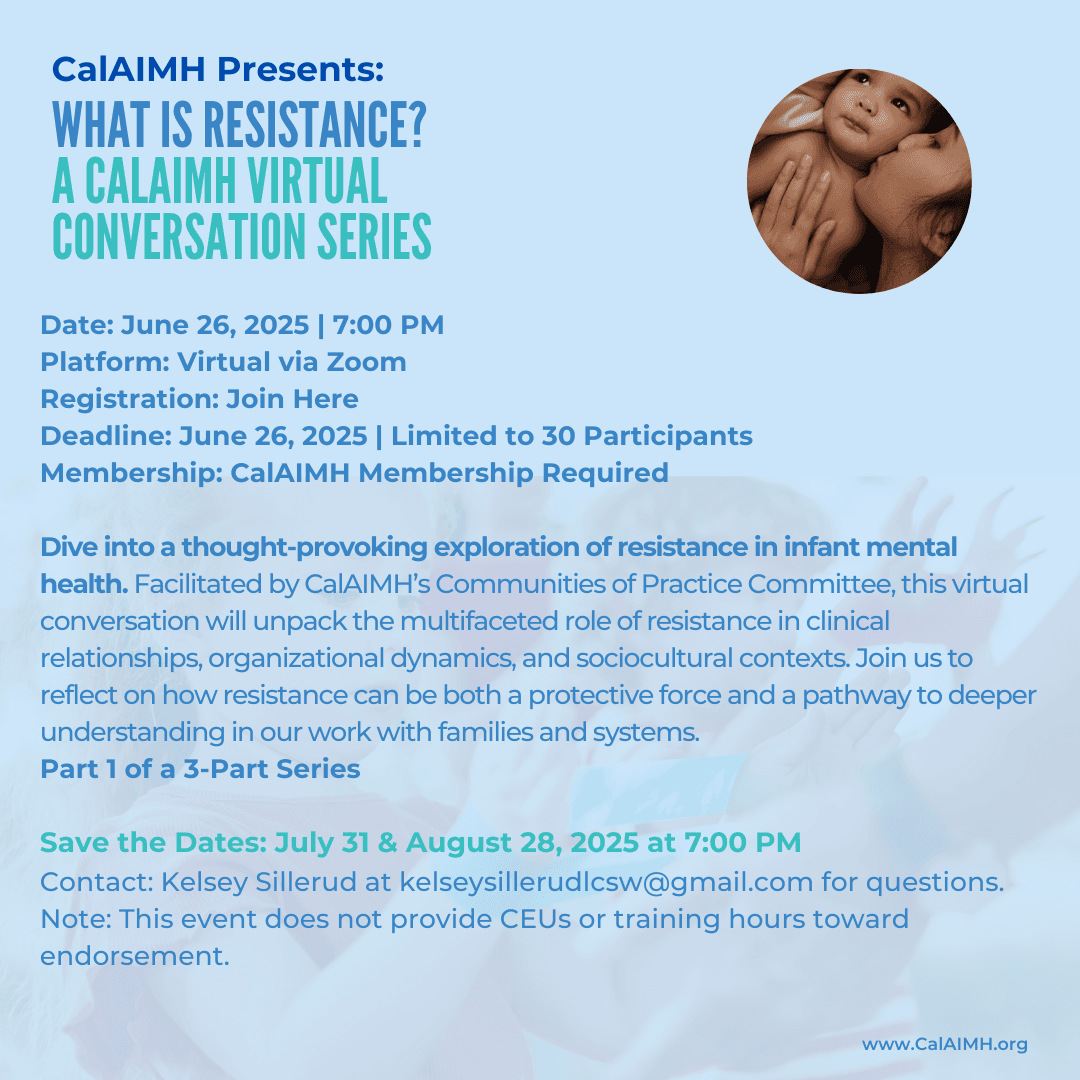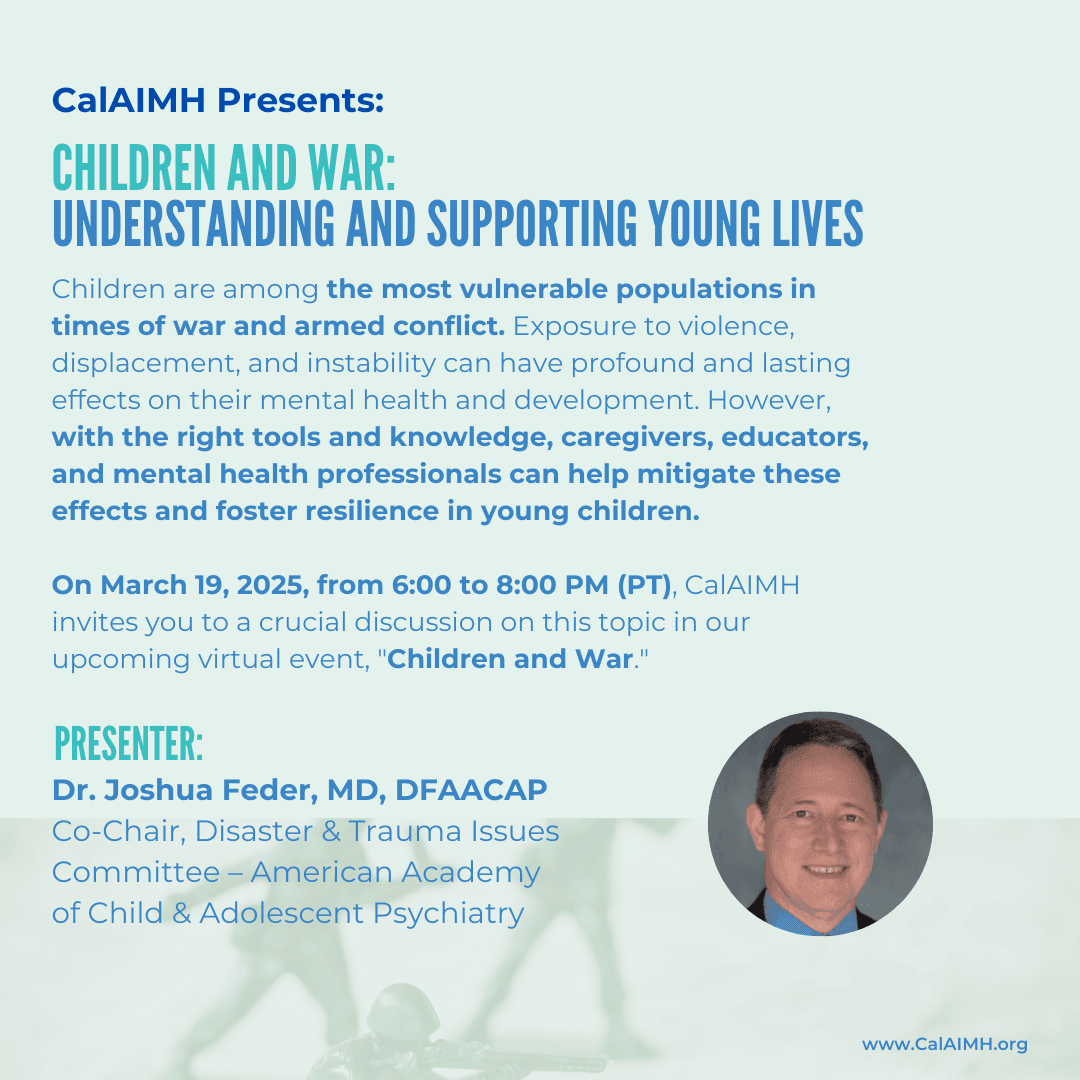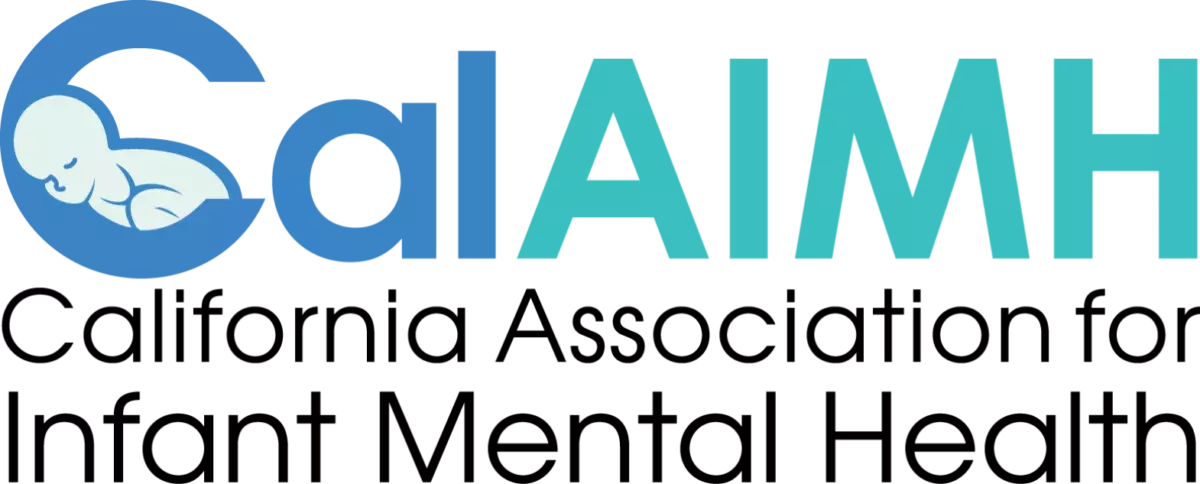Stay updated with the latest news from our community
🌱 Rooted in Hope: Healing Our Village Through Empowerment and Connection ✨
🗓 November 14-15 | 8:00 a.m. – 4:30 p.m.
📍 Friday & Saturday
Rooted in Hope: Healing Our Village Through Empowerment and Connection is a two-day gathering, November 14–15 in Sacramento, dedicated to healing, empowerment, and community connection. Through inspiring keynotes, hands-on workshops, and spaces for reflection, we will bring together leaders, professionals, and families to share tools, experiences, and innovative approaches in early childhood mental health, social justice, and community resilience. Join us for this transformative event to learn, be inspired, and strengthen hope in our communities.
What is Resistance? A CalAIMH Virtual Conversation Series
Date: June 26, 2025 | 7:00 PM
Format: Virtual via Zoom
Registration: Join Here
Deadline: June 26, 2025
Eligibility: CalAIMH Members Only | Limited to 30 Participants
Join the California Association for Infant Mental Health for a compelling virtual conversation exploring the concept of resistance in infant mental health. Facilitated by our Communities of Practice Committee, this event will delve into how resistance manifests in clinical relationships, organizational systems, and sociocultural contexts. Together, we’ll reflect on its role as both a protective mechanism and a pathway to deeper understanding in our work with infants, families, and communities.
This event is the first of a three-part series, with additional sessions on July 31 and August 28, 2025, at 7:00 PM.
Secure your spot today—space is limited! For questions, contact Kelsey Sillerud at [email protected].
Note: This event does not provide CEUs or training hours toward endorsement.
Children and War:
Understanding and Supporting Young Lives
The Lasting Impact of Armed Conflict on Children
Children are among the most vulnerable populations in times of war and armed conflict. Exposure to violence, displacement, and instability can have profound and lasting effects on their mental health and development. However, with the right tools and knowledge, caregivers, educators, and mental health professionals can help mitigate these effects and foster resilience in young children.
On March 19, 2025, from 6:00 to 8:00 PM (PT), CalAIMH invites you to a crucial discussion on this topic in our upcoming virtual event, “Children and War.”
What You’ll Learn
This session, led by Dr. Joshua Feder, MD, DFAACAP, will cover:
✅ The impact of armed conflict on young children – How war and displacement affect early childhood development.
✅ Evidence-based approaches to address trauma – Strategies backed by research to support children in conflict-affected environments.
✅ Techniques to help families cope – Practical ways to assist children and families, including those no longer living in conflict zones but still experiencing the effects of war.
Dr. Feder brings decades of experience working with children and families affected by violence, armed conflict, and climate disasters. His expertise spans research, policy development, and advocacy at both national and international levels.
Who Should Attend?
This event is open to mental health professionals, educators, caregivers, social workers, and anyone passionate about supporting young children impacted by conflict. Whether you work directly with children or want to deepen your understanding of trauma-informed care, this session will provide valuable insights.
Registration & CEUs
For those seeking Continuing Education Units (CEUs), certification will be available for an additional fee at the time of registration.
Members please log in to your account prior to registering
🎟️ CalAIMH Members: Free REGISTER HERE (NO CEUs)
🎟️ Non-Members: $25 REGISTER HERE (NO CEUs)
📢 Total with CEUs:
💳 Members: $30 REGISTER HERE (With CEUs)
💳 Non-Members: $55 REGISTER HERE (With CEUs)
How to get your continuing education certificate
-
Register and attend the Children and War training(registration fees are in addition to the CE fee). Visit www.calaimh.org to register.
-
Pay the $30 CE fee for the training you are registered to attend. You may pay the fee anytime before the training. Make your payment with the link at www.calaimh.org
-
Complete the CE evaluation forms at the end of the session. In order to receive your CEs, you must complete the evaluation form within 3 days of the session.
-
Proof of attendance will be verified before a certificate is provided. Evaluation forms will be accepted at the end of each scheduled session via survey link. Certificate will be provided within a month of session.
California Association for Infant Mental Health (CAL258) is approved by the California Psychological Association to provide continuing professional education for psychologists. California Association for Infant Mental Health maintains responsibility for this program and its content.
CONTINUING EDUCATION PROGRAM INFORMATION
FEES: Continuing education certificate fee for training is $30 for each session. Training/Workshop registration is in addition to CE fee (see www.calaimh.org for training registration).
TARGET AUDIENCE: Behavioral health, child welfare, early intervention, early care and early education professionals working with children aged birth-to-five years old and their families in public and private systems.
CE CREDIT: Training meets the qualifications for up to 2 hours of continuing education credit for LMFTs, LCSWs, LPCCs, and/or LEPs as required by the California Board of Behavioral Sciences. The California Association for Infant Mental Health is approved by the California Psychological Association to provide continuing professional education for psychologists. The California Association for Infant Mental Health maintains responsibility for this program and its content.
CERTIFICATES: Certificates of completion will be distributed by email after the conference and after submission of course evaluation and confirmation of attendance.
IMPORTANT NOTICE: Those who attend each session in full and complete the appropriate evaluation form will receive CE credits. Please note that credits will only be granted to those who attend the entire session. Those arriving more than 10 minutes after the start time or leaving before the session is completed will not receive CE credit.
GRIEVANCES: To report a grievance please email [email protected]. Grievance policy may be accessed at www.calaimh.org.






